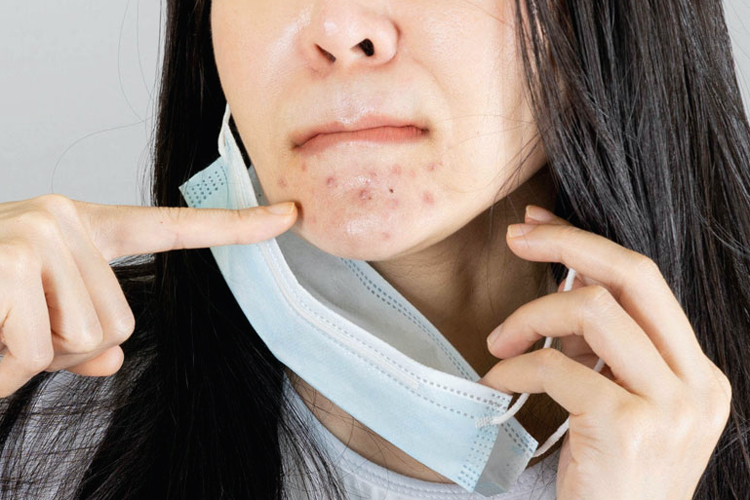A lot has changed in the last few months, including the regular use of face masks. If you diligently wear a face mask you may have noticed your skin reacting negatively to this new 2020 accessory — maskne.
“Maskne” – or acne mechanica as professionals call it – is pimples located in areas where your mask touches your face. Maskne occurs when sweat, oil and bacteria are trapped on your skin while wearing a mask, creating the perfect breeding ground for breakouts.
This type of acne is different from blemishes caused by hormones or hereditary issues like cystic acne. Especially prevalent on the bridge of your nose, your cheeks and your chin, maskne is caused by an external factor – a mask obstructing the skin and causing excess pressure, heat and rubbing, which leads to irritation, inflammation and pimples. Arizonans may experience maskne more intensely than people from other parts of the country, too, because of our extreme heat, extra sweat and need for daily sunblock.

To avoid maskne, you may need to modify your daily skincare routine slightly.
Wash your face regularly. Be meticulous about washing your face twice a day. At Stockton Dermatology we recommend using a product with benzoyl peroxide like CeraVe’s Acne Foaming Face Wash in the morning and a gentle cleanser in the evening. Stay away from any harsh products, toners or exfoliators that will just cause more inflammation and acne.
Apply moisturizer. After washing your face apply a lightweight, oil-free, non-clogging moisturizer to prevent dryness and repair the skin’s natural protective barrier.
Skip the makeup. Right now, is a good time to let your skin breathe. Wearing too many products under your mask (i.e. foundation, concealer, powder) can cause a build-up on the skin and lead to additional irritation and breakouts.
Take care of your mask. If you are using a cloth mask, make sure to wash it daily in warm water and dry it completely. If you are wearing a disposable mask, replace it as often as possible to avoid a build-up of oil and sweat or allow it to air out in between uses.
Spot-treat when needed. If you’re already experiencing a crop of mask-related pimples, we recommend using a spot treatment like Neutrogena Rapid Spot Clear. A product like this usually helps resolve situational acne a day or two faster than leaving irritations to heal on their own. Whatever you do, don’t try to pick or pop a pimple. This is likely to lead to infection and possible scarring.
Right now, at Stockton Dermatology we are seeing an increase in acne mechanica. Since it looks like face masks are here to stay for a while, being conscientious about taking care of your skin is more important than ever. If you experience maskne or other breakouts that persist more than a few days, consider reaching out to a dermatologist who will be able to provide expert advice and products to help deal with your skin concerns.
John Shaff, PA-C, DFAAPA at Stockton Dermatology in Ahwatukee, is a member of the American College of Surgeons, American Academy of Physician Assistants, and Arizona State Association of Physician Assistants and the Society of Dermatology Physician Assistants. In 2017, Shaff was appointed by the Governor of Arizona to serve on the Arizona Regulatory Board of Physician Assistants.




